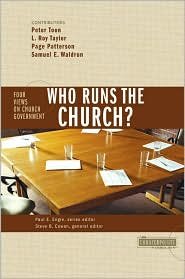Stanley N. Gundry, Paul E. Engle, Steven B. Cowan, Editors, Who Runs the Church: 4 Views of Church Government (Counterpoints: Church Life). Zondervan, 2004.
Referenced in: Plural-Elder Congregational Leadership
LifeandLeadership.com Summary
This is an excellent comparative look at four different types of church government, written in counterpoint style where a representative of each viewpoint makes a case, followed by a response from those of a different perspective. It is similar to Perspectives on Church Government with slightly different categorizations.
Below is a summary of the four perspectives (see pages 12-15) and other contributions of the authors:
Episcopalianism – An episcopate (bishop) works distinct from and superior to the officers of local churches. It is also hierarchical, with the bishop ordaining and governing the leaders (often called priests or rectors) of several local parish churches. The territory and churches over which the bishop rules is called a “diocese.” Churches that practice this include Roman Catholic, Episcopal, Greek Orthodox, Anglican, United Methodist, and some Lutherans.
Presbyterianism – A “representative” form of church government where the local church is ruled by a group of elders (a “session”) who are chosen by the congregation. Member of the sessions of several congregations form an area presbytery, which has ruling authority over the represented churches. Some members of the presbytery are members of the general assembly which governs the entire denominational body. Most of these churches distinguish between ruling elders who lead, set policy, and supervise, and teaching elders who preach and teach in the church. Churches that practice this include Presbyterian Church (USA), Presbyterian Church (PCA), Christian Reformed Church, the Assemblies of God.
Congregationalism – These churches believe in the autonomy of the local church, sometimes call independency. Each local church, under the authority of Christ, governs itself, and not ecclesiastical authority exists outside the local assembly of believers. There is considerable variety of among Congregationalists (Wayne Grudem lists five systems, Systematic Theology, 928-36). The book represents the two most prominent Congregationalist models:
Single-Elder Congregationalism – The local church is overseen by one elder or pastor chosen by the congregation and clearly distinguished as its leader. This elder is usually assisted by (or in some cases supervised) a group of deacons. Some have additional staff persons who work under the single elder as the senior pastor. Most Southern Baptist churches operate with this model.
Plural-Elder Congregationalism – These see the biblical design as the local congregation led by a plurality of elders. Unlike Presbyterianism, these elders have no authority outside their local church, and there is no distinction between teaching and ruling elders, i.e. all elders both teach and rule. Also, a church with only one elder is viewed as deficient, and all elders are consider equal in authority. These churches strongly reject the ideas of the senior or primary pastor. Many Christian Churches and Churches of Christ operate with this model.
In the book each representative deals with these six interrelated issues with regard to church government.
- The structure of church government
- The number and nature of church officers
- The historical development of church government
- Hermeneutical assumptions
- The biblical data relevant to church government
- The practical implications of church government
From the Publisher
Churches have split and denominations have formed over the issue of church government. Yet while many Christians can explain their particular church’s form of rule and may staunchly uphold it, few have a truly biblical understanding of it. What model for governing the church does the Bible provide? Is there room for different methods? Or is just one way the right way?
In Who Runs the Church? Four predominant approaches to church government are presented by respected proponents:
- Episcopalianism (Peter Toon)
- Presbyterianism (L. Roy Taylor)
- Single-Elder Congregationalism (Paige Patterson)
- Plural-Elder Congregationalism (Samuel E. Waldron)
As in other Counterpoints books, each view is followed by critiques from the other contributors, and its advocate then responds. The interactive and fair-minded nature of the Counterpoints format allows the reader to consider the strengths and weaknesses of each view and draw informed, personal conclusions.
About the Authors
Stanley N. Gundry is executive vice president and editor-in-chief for the Zondervan Corporation. He has been an influential figure in the Evangelical Theological Society, serving as president of ETS and on its executive committee, and is adjunct professor of Historical Theology at Grand Rapids Theological Seminary. He is the author of seven books and has written many articles appearing in popular and academic periodicals.
Steven B. Cowan (M.Div.; Ph.D.) is associate professor of Philosophy and Apologetics at Southeastern Bible College in Birmingham, AL.
Peter Toon (Ph.D., Oxford University) is rector of Christ Church, Biddulph Moor, Diocese of Lichfield, in the Church of England.
Dr. L. Roy Taylor is a native of Birmingham, Alabama. He has served as a Presbyterian Churches in America (PCA) pastor for sixteen years, as a professor at Reformed Theological Seminary for ten years, and as stated clerk of the General Assembly of the PCA since 1998. He has written various article and is the author of several books, including Four Views on Church Government (Countperpoints series, Zondervan). He and his wife, Donna, have two children and five grandchildren.
Paige Patterson (Th.D., New Orleans Baptist Theological Seminary) is president of the Southwestern Baptist Theological Seminary in Fort Worth, TX.
***For additional information on this resource, including reviews, click the bookstore links. Check the reference at page top or the links below for resource guides on related topics.***
Other Ministry Resource Guides:
- Church Leadership and Renewal
- Elders, Plural-Elder Congregational Leadership
- Elders, Policy Governance Models
- Pastoral Theology
See Resources on Over 100 Areas of Ministry Leadership:


